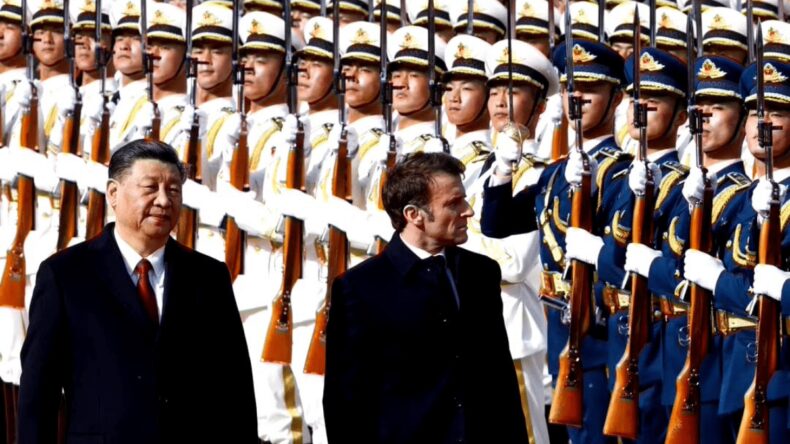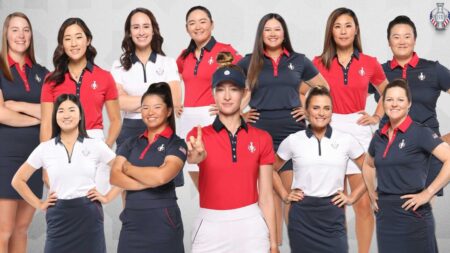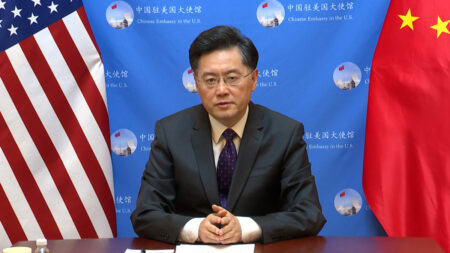French President Emmanuel Macron urged China’s Xi Jinping on Thursday to negotiate a settlement to the Ukraine conflict with his country’s close ally Russia.
In response, Xi expressed his hope that the two parties could begin talks as soon as feasible.Ursula von der Leyen, the head of the EU, and Macron are having carefully watched discussions in Beijing about how to resolve the crisis and avoid spiralling tensions that could divide world powers into belligerent blocs.
Xi urged Ukraine and Russia to restart peace negotiations and find a political solution to the conflict in remarks made after he met Macron.Macron also requested that Xi put pressure on Russia to abide by the conventions on the non-proliferation of nuclear weapons. The deployment of tactical nuclear weapons in Belarus, a country that borders Ukraine, has been announced by Russian President Vladimir Putin. This is viewed as a potentially hazardous escalation in the bloody year-long conflict.
Without mentioning Russia, Xi stated that all nations should uphold their pledges to refrain from using nuclear weapons and that “nuclear war shouldn’t be waged.”The journey of the EU leaders to China comes after years of deteriorating relations between Beijing and Brussels over issues such as claims of rights violations in Xinjiang, a deadlocked investment agreement, and China’s reluctance to denounce Russia for its invasion of Ukraine.
The European Union (EU) and China have a complex and multifaceted relationship that encompasses economic, political, and strategic dimensions. At its core, the relationship is based on economic interdependence, with China is EU’s second-largest trading partner after the United States, and the EU being China’s largest trading partner.The EU and China have engaged in extensive economic cooperation since the establishment of diplomatic relations in 1975.
However, tensions have emerged in recent years over issues such as market access, intellectual property rights, and state subsidies. The EU has accused China of engaging in unfair trade practices, such as dumping goods in European markets, while China has accused the EU of protectionism.In 2019, the EU and China reached a comprehensive investment agreement, which was hailed as a significant milestone in their economic relationship. The agreement aims to increase market access and create a level playing field for European companies in China, as well as provide more investment opportunities for Chinese companies in the EU.
However, the agreement has been put on hold following sanctions imposed by both sides, with the EU accusing China of human rights abuses against the Uyghur minority in Xinjiang, and China retaliating with sanctions of its own.Beyond economics, the EU and China also have different approaches to global governance and human rights. The EU places a high value on democratic principles, human rights, and the rule of law, while China has been criticized for its human rights record and lack of political freedom. These differences have led to tensions in their relationship, particularly concerning issues such as Hong Kong, Taiwan, and the South China Sea.
The EU has been increasingly vocal in its criticism of China’s human rights record, particularly regarding the treatment of the Uyghur minority in Xinjiang. In March 2021, the EU joined the United States, Canada, and the United Kingdom in imposing sanctions on Chinese officials over human rights abuses in Xinjiang. In response, China imposed sanctions on several EU officials and entities, including members of the European Parliament and a think tank.Overall, the EU’s relationship with China is complex and multifaceted, with economic interdependence serving as a key driver of the relationship. However, tensions have emerged over issues such as market access, intellectual property rights, and human rights. The EU’s commitment to democratic principles and human rights has led to criticism of China’s policies in these areas, which has further strained their relationship.
Macron, however, told the media that Europe must reject cutting off trade and diplomatic relations with China and reject what some have called an “inescapable spiral” of conflict between China and the West when he spoke to the media on Wednesday following his arrival.
Before meeting Xi, Macron also discussed with Premier Li Qiang. During the elaborate ceremony outside the Great Hall, the two leaders walked side by side along a red carpet while a brass band played their respective national anthems.













